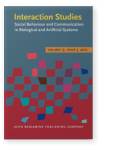Baggs, Edward & Anthony Chemero
2021.
Radical embodiment in two directions.
Synthese 198:S9
► pp. 2175 ff.

Bennett, Casey C.
2021.
2021 30th IEEE International Conference on Robot & Human Interactive Communication (RO-MAN),
► pp. 362 ff.

Białecka-Pikul, Marta, Magdalena Kosno, Arkadiusz Białek & Marta Szpak
2019.
Let’s do it together! The role of interaction in false belief understanding.
Journal of Experimental Child Psychology 177
► pp. 141 ff.

Bohl, Vivian
2015.
We read minds to shape relationships.
Philosophical Psychology 28:5
► pp. 674 ff.

Cerutti, Michele
2023.
Physiognomic theories between equation and inference.
Chinese Semiotic Studies 19:3
► pp. 387 ff.

Cowley, Stephen J. & Matthew I. Harvey
2016.
The illusion of common ground.
New Ideas in Psychology 42
► pp. 56 ff.

Cowley, Stephen J. & Frédéric Vallée-Tourangeau
2013.
Systemic Cognition: Human Artifice in Life and Language. In
Cognition Beyond the Brain,
► pp. 255 ff.

De Jaegher, Hanne, Anssi Peräkylä & Melisa Stevanovic
2016.
The co-creation of meaningful action: bridging enaction and interactional sociology.
Philosophical Transactions of the Royal Society B: Biological Sciences 371:1693
► pp. 20150378 ff.

Faiciuc, Lucia-Elisabeta
2023.
A Nonlinear Dynamic Approach of the Notion of Interaction.
Integrative Psychological and Behavioral Science 57:3
► pp. 758 ff.

Filho, Edson, Maurizio Bertollo, Gabriella Tamburro, Lorenzo Schinaia, Jonas Chatel-Goldman, Selenia di Fronso, Claudio Robazza & Silvia Comani
2016.
Hyperbrain features of team mental models within a juggling paradigm: a proof of concept.
PeerJ 4
► pp. e2457 ff.

Froese, Tom, Hiroyuki Iizuka & Takashi Ikegami
2013.
From synthetic modeling of social interaction to dynamic theories of brain–body–environment–body–brain systems.
Behavioral and Brain Sciences 36:4
► pp. 420 ff.

Froese, Tom, Hiroyuki Iizuka & Takashi Ikegami
2014.
Embodied social interaction constitutes social cognition in pairs of humans: A minimalist virtual reality experiment.
Scientific Reports 4:1

Froese, Tom, Hiroyuki Iizuka & Takashi Ikegami
2014.
Using minimal human-computer interfaces for studying the interactive development of social awareness.
Frontiers in Psychology 5

Froese, Tom, Giovanni Stanghellini & Marco O. Bertelli
2013.
Is it normal to be a principal mindreader? Revising theories of social cognition on the basis of schizophrenia and high functioning autism-spectrum disorders.
Research in Developmental Disabilities 34:5
► pp. 1376 ff.

Gangopadhyay, Nivedita
2017.
The future of social cognition: paradigms, concepts and experiments.
Synthese 194:3
► pp. 655 ff.

García, Enara, Ezequiel A. Di Paolo & Hanne De Jaegher
2022.
Embodiment in online psychotherapy: A qualitative study.
Psychology and Psychotherapy: Theory, Research and Practice 95:1
► pp. 191 ff.

Hermans, Karlijn S. F. M., Olivia J. Kirtley, Zuzana Kasanova, Robin Achterhof, Noëmi Hagemann, Anu P. Hiekkaranta, Aleksandra Lecei, Leonardo Zapata-Fonseca, Ginette Lafit, Ruben Fossion, Tom Froese & Inez Myin-Germeys
2023.
Ecological and Convergent Validity of Experimentally and Dynamically Assessed Capacity for Social Contingency Detection Using the Perceptual Crossing Experiment in Adolescence.
Assessment 30:4
► pp. 1109 ff.

Huisman, Gijs
2022.
An Interaction Theory Account of (Mediated) Social Touch.
Frontiers in Psychology 13

Jurgens, Alan & Michael D. Kirchhoff
2019.
Enactive social cognition: Diachronic constitution & coupled anticipation.
Consciousness and Cognition 70
► pp. 1 ff.

Kaiser, Niclas & Emily Butler
2021.
Introducing Social Breathing: A Model of Engaging in Relational Systems.
Frontiers in Psychology 12

Kimmel, Michael, Christine Irran & Martin A. Luger
2015.
Bodywork as systemic and inter-enactive competence: participatory process management in Feldenkrais® Method and Zen Shiatsu.
Frontiers in Psychology 5

Kojima, Hiroki, Tom Froese, Mizuki Oka, Hiroyuki Iizuka & Takashi Ikegami
2017.
A Sensorimotor Signature of the Transition to Conscious Social Perception: Co-regulation of Active and Passive Touch.
Frontiers in Psychology 8

Laroche, Julien, Anna Maria Berardi & Eric Brangier
2014.
Embodiment of intersubjective time: relational dynamics as attractors in the temporal coordination of interpersonal behaviors and experiences.
Frontiers in Psychology 5

Lehmann, Konrad, Dimitris Bolis, Karl J. Friston, Leonhard Schilbach, Maxwell J. D. Ramstead & Philipp Kanske
2023.
An Active-Inference Approach to Second-Person Neuroscience.
Perspectives on Psychological Science 
Lindblom, Jessica
2020.
A Radical Reassessment of the Body in Social Cognition.
Frontiers in Psychology 11

Lo Presti, Patrizio
2016.
Whose mind? Two interpretations of what it is to directly perceive other minds.
Theory & Psychology 26:4
► pp. 419 ff.

Lou, Vivian W. Q. & Annie A. N. Dai
2017.
A Review of Nonfamilial Intergenerational Programs on Changing Age Stereotypes and Well-Being in East Asia.
Journal of Intergenerational Relationships 15:2
► pp. 143 ff.

Noguchi, Wataru, Hiroyuki Iizuka, Masahito Yamamoto & Shigeru Taguchi
2022.
Superposition mechanism as a neural basis for understanding others.
Scientific Reports 12:1

Poizat, Germain, Simon Flandin & Jacques Theureau
2023.
Author’s reply to the commentaries: Clearing up misunderstandings about the course-of-experience framework and laying the groundwork for future discussions.
Adaptive Behavior 31:2
► pp. 175 ff.

Pokropski, Marek
2017.
Mental concepts: theoretical, observational or dispositional approach?.
Hybris 38:3
► pp. 58 ff.

Satne, Glenda
2021.
Understanding others by doing things together: an enactive account.
Synthese 198:S1
► pp. 507 ff.

Tison, Rémi
2023.
Interaction sociale et cognition animale.
Philosophiques 50:1
► pp. 77 ff.

Trujillo, James P. & Judith Holler
2023.
Interactionally Embedded Gestalt Principles of Multimodal Human Communication.
Perspectives on Psychological Science 18:5
► pp. 1136 ff.

Tyurikov, A. G., A. Ya. Bolshunov & S. A. Bolshunova
2022.
Communication Production as a Primary Criterion for the Effectiveness of Intercultural Communication.
Humanities and Social Sciences. Bulletin of the Financial University 11:4
► pp. 50 ff.

Vasterling, Veronica
2015.
Heidegger’s hermeneutic account of cognition.
Phenomenology and the Cognitive Sciences 14:4
► pp. 1145 ff.

This list is based on CrossRef data as of 31 march 2024. Please note that it may not be complete. Sources presented here have been supplied by the respective publishers.
Any errors therein should be reported to them.
